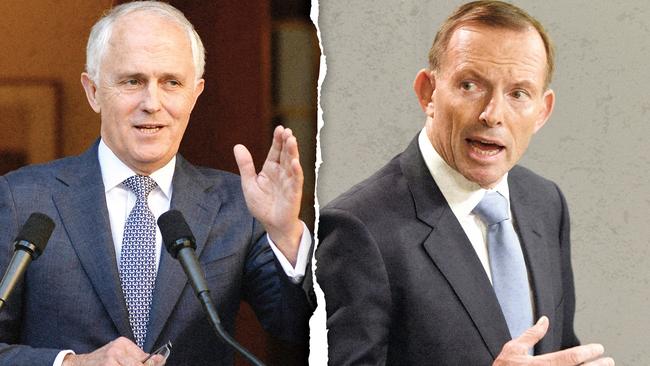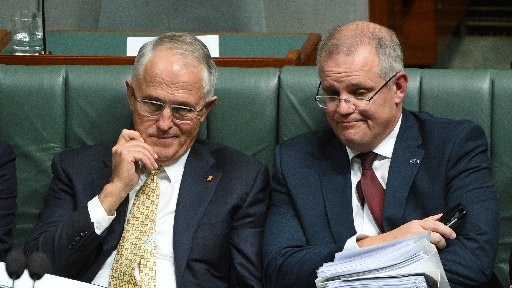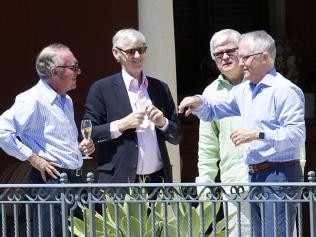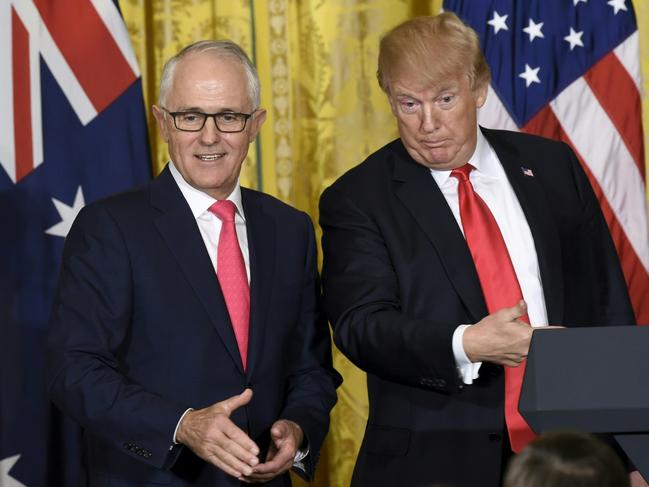A bigger picture of the real Malcolm Turnbull, warts and all
Malcolm Turnbull was his own boss from an early age, combining hard work and brilliance to succeed.

Malcolm Turnbull is a great writer, as well as a great friend. That doesn’t mean we agree on all things. However, I can say that I think so highly of him, he has been best man at both my weddings. The delight in his happy marriage to a strong partner, with great kids and grandkids, comes through clearly as a theme in Malcolm’s autobiography, A Bigger Picture, to be released on Monday. As he says in Chapter 39, titled Same-Sex Marriage: “I have always been an advocate for marriage.”
There’s no doubt his emphasis on family stems from his own upbringing (and, indeed, that of his wife) as the child of divorced parents and of being somewhat of a loner. In 700 pages, he covers a lot of areas in a distinguished and eventful career.
His mother, Coral Lansbury (cousin of Murder She Wrote star Angela Lansbury), a radio script writer and then novelist before she turned to academe, could dash off a book in an afternoon. Malcolm has always had the same gift. He procured one of the first PCs in the early 1980s, an Osborne (which looked like a sewing machine), which fed his appetite not only for productivity but also for tech. An early adopter from way back.
Even though I knew him from university, I properly met Malcolm when I worked at Kerry Packer’s establishment law firm Allen Allen and Hemsley and then went to work for Malcolm when he joined Consolidated Press Holdings as general counsel. I remember in 1982 or so he was reported on the radio as earning more than $100,000 a year, a massive figure in those days. He had been a barrister but gave it up when his father died in a tragic light plane crash at 56 — because he needed to sort out the estate. That consisted of diverse interests in hotel syndicates that Malcolm sorted through with his customary perception and devotion.
Malcolm buried his father on the farm that his dad had only recently bought in the Hunter Valley near Scone, East Rossgole, when he had achieved a measure of business success after a lot of hard work. Later, when Coral died, they buried her on the farm beside Bruce, and Malcolm’s then very young daughter Daisy (a romantic) remarked: “Isn’t it nice grandpa and Coral are together at last.”

She had no idea of the tortuous path their relationship had taken.
A Bigger Picture is full of personal touches and reflections that are touching in their honesty, such as Malcolm struggling with the bullying culture at boarding school. It has a sense of succeeding against the odds. There is a hilarious scene when Malcolm comes home to their flat and his father has purloined furniture from the dentist below — streamlined waiting room furniture, which he describes as being like out of the Jetsons.
We worked out of the third floor of the Australian Consolidated Press offices at 54 Park Street, Sydney. Malcolm’s office was around the corner from Packer’s on the third floor. Bruce Gyngell, the father of David and the first face on Australian television, was an early mentor. Ann Gyngell, Bruce’s wife (and a leading decorator), had decorated the third floor with a dark green glazed wall and bright orange carpet complemented by brown mahogany furniture and many fine Australian paintings together with Sir Frank Packer’s framed Daily Telegraph headline “STALIN DEAD: GOOD”.
Malcolm loves practical jokes. When he arrived at the Savoy Hotel one day he informed the reception that one of the CPH executives was, in fact, Kerry’s driver and he was taken to a chauffeurs’ room, which he found less than hilarious. Malcolm also is a great wit. His charm can be seen when he engages with people. But like many he can hurt easily and is genuinely mystified when they don’t agree with or warm to him.
He and Kerry Packer made a hilarious combination. Both were constantly trying to make sense out of the other. Packer himself had a piercing wit as well and could make people uncomfortable by getting straight to the point. But he respected and knew that Malcolm had saved his bacon. Not only legally but in the PR war.
Malcolm was forced to go to boarding school because of his father’s travel routine as a hotel broker. At an early age he was imbued with the spirit of enterprise and being his own boss and not kowtowing to anyone.
It’s very much an Australian story, and not one of entitlement. Neville Wran and Lionel Murphy, old friends of his mother, feature in his life and Malcolm became acquainted with Neville (who helped his mother negotiate her widow’s settlement from her husband before Malcolm’s father) when Malcolm was political correspondent for radio station 2SM and Nine. He would rush across the road from where the University of Sydney law school was in Phillip Street to NSW Parliament House in Macquarie Street. One of his lecturers, a northern Englishman, was not impressed when his beeper went off. “Off to serve your capitalist bosses, Turnbull,” he said, as Malcolm rushed out of the subterranean law school.
Malcolm features a nice tribute to Gough Whitlam in his book. I always remember when Malcolm published Spycatcher after his victory in the celebrated case. Whitlam came along to the Mint in Macquarie Street, Sydney, to launch it. “At the age of 28 Malcolm Turnbull has written a book,” Whitlam said in distinctive cadences, in somewhat of a piss-take. “But we cannot forget that at that age Alexander had conquered the world and Jesus had saved it.” The crowd loved it.
Malcolm’s experiences with Gough’s oldest son, Nick, were less fun as Packer and others backed the two of them and Wran in an investment bank originally called Whitlam Turnbull. The bank enjoyed some great successes. Wran was the chairman and a source of calm. They used to make a joke that Nick could open the doors that Malcolm couldn’t kick down. But sadly it ended in tears.
In their heyday Malcolm and Nick’s firm advised Warwick Fairfax after the stockmarket crash of 1987 as he tried to defend his takeover of Fairfax, as well as other entrepreneurs and ultimately, probably thanks to Wran, the West Australian government in the WA Inc scandal.
Strong moral streak
Malcolm is frank about how you don’t make friends in politics, and that the only people you can trust are those who tell you they won’t vote for you.
Nevertheless, he talks of the trauma he experienced after being deposed from the Liberal leadership the first time, in the shadow of the Grech-Utegate affair. His determination to apologise to Kevin Rudd (when everyone cautioned him it would not have mattered if the boot had been on the other foot) shows his strong moral streak. I remember feeling I helped talk him out of giving up the seat of Wentworth, but it’s clear to me in retrospect that many people gave him similar advice, except perhaps for his wife.
Malcolm’s chapter on the National Broadband Network shows, in my opinion, the unique perspective he brought to a complex problem. He has never had a fair go from Labor, or Rudd in particular. However, he was totally focused on delivering an economic solution that wouldn’t consume the whole national debt. The Rudd snipe that, in changing the NBN from fibre to the home to fibre to the node, Malcolm acted at Rupert Murdoch’s behest to protect Foxtel is simply misguided, and ignores everything that News and Malcolm are at odds about.
Malcolm recounts in the book how Rudd phoned him to ask for his support for the UN secretary-general candidacy. When told Malcolm didn’t think he (Rudd) was suitable, as Malcolm puts it, the former prime minister screamed at him, proving all that he had said was true.

Many of the chapters, which cover a wide variety of topics, are long. But readers can quickly move on to the next if not to their liking or special interest. His chapters on water rights are again a focus for his passion and his refusal to be deterred by crushing detail or state political obstacles that would put less analytical or confident people off. I remember Malcolm’s line about how the economics of water (that is, the cheapness) are inconsistent with the physics of water (in terms of difficulty and cost of reticulation). Similarly his focus on the Snowy Hydro project for major policy.
The book is full of great characters. There are his mother’s theatrical and literary antecedents, Angela Lansbury, with whom Malcolm has a strong relationship, and uncle George Lansbury, the British Labour politician of last century. There’s also Lucy’s father, Tom Hughes QC, the former attorney-general and leading silk who may have fostered in Malcolm the love for advocacy. And then there’s Robert Hughes, Tom Hughes’s youngest brother and Lucy’s uncle, a big figure in their family as the legendary Time magazine correspondent and art critic. And, of course, there’s Lucy, whose own successes in banking law and local government are part of the family story and generously acknowledged.
It’s hard to throw much new light on the Tony Abbott-Turnbull saga. Nevertheless, it’s a big feature of the book. The two were at Sydney University and at Oxford together with Abbott being a Rhodes scholar before Malcolm. And Malcolm’s discord with Peter King (his preselection opponent who was the former member for Wentworth) was also unfortunate, but Sydney is like that.
Confident negotiator
After winning Wentworth, Malcolm was a fantastic local member and all those who thought he was a show pony were impressed at how hard he worked, how effective his electoral office was, and how committed he was to local causes. He was in constant attendance at all kinds of functions and prepared to speak to and help anyone who asked. His strong links to the electorate since birth stood him in good stead and extended to Bondi, Kings Cross, Darlinghurst, and not just Vaucluse, Double Bay and Bellevue Hill. He engaged with people wherever he went around his electorate.
Reading the book, a lot of what happened in his prime ministerial years reminds you of issues that have seemingly passed but generated much debate at the time, including the dual citizenship shemozzle and the Barnaby Joyce episode including the “bonk ban” edict (which by corporate standards does seem fairly routine and, as Malcolm says, is about power imbalance). Malcolm certainly wasn’t afraid to act on principle, as he showed over Joyce, possibly making an enemy of someone who otherwise may have been supportive.
His chapter on Donald Trump and how Malcolm stood his ground with him is good reading. It shows the confidence he brings to negotiation, his calm insistence when required and an appreciation of a potential bully’s perspective. “Melania,” he quotes Trump as saying, “do you know Malcolm has 2000 of the worst terrorists in the world locked up on a desert island and that fool Obama agreed to take them. Can you believe that? And now Malcolm has talked me into taking them too! He got me to do something I promised never to do.”

The leadership challenge against Abbott was the background for so much of what followed. The fear of possible defeat that the party experienced at the time of the challenge was replaced by resentment at losing seats in 2016.
When you remember the rapture and expectation that followed Malcolm’s original assumption of the prime ministership you realise how much was expected. Malcolm deals well with the question of why he didn’t seek to capitalise on it with an early election when polls were high following the leadership change and sadly the Liberal Party’s finances appear to be a major reason.
In Chapter 47 on the coup that cost him the prime ministership, Malcolm asks if precipitating the leadership spill on the Tuesday was a mistake. But he still thinks it was the right call as “the insurgents had momentum”. The final chapter is a very sad one as people progressively deserted him and then the scramble for 43 signatures. The personal betrayals cut Malcolm very deeply as they were from people he trusted and with whom he thought he had a real rapport and understanding and support.
Malcolm deals sensitively with his relations with Scott Morrison, but doesn’t pull any punches. Sadly, you are left with the unavoidable reality of a political system where people can generally succeed only at the expense of others. But that doesn’t take away the personal sense of betrayal that people naturally feel.
There’s an exchange quoted in the book with Murdoch — where Murdoch accuses him of having done the same thing to Abbott. But from Malcolm’s perspective he would have left parliament had he lost his challenge. It’s a point he feels strongly about.
Destined for the Lodge
Malcolm’s father and mother would be enormously proud of what their son has achieved. So much of it is by virtue of hard work and persistence and not giving up, with liberal doses of application and brilliance, it has to be said. Malcolm always said that when he was a child his mother would make him unpopular by telling all his friends’ parents that he was destined for the Lodge, and his father always told him not to take himself too seriously and to lighten up.
Malcolm has always been a generous friend. We had a great partnership in the law and I’ll always be grateful our paths crossed, and continue to. He is generous in acknowledging others’ achievements and input. This book is an excellent slice of recent history and examination of an intriguing character and fascinating times.
On the Sunday night when they returned from Canberra after being deposed as prime minister, Malcolm and Lucy came to our house with a few close friends. The mood was pretty down. Malcolm was constantly going into the next room as his iPhone lit up with Benjamin Netanyahu, Shinzo Abe, and so on calling. He always loved being prime minister and said as much.
He was focused. He was devoted and professional. He operated in a very political time and ultimately was brought down by politics. He had always relished the cut and thrust, so it’s sad, not tragic. It was amazing that Morrison managed to win the election and in one sense he has been cut a lot more slack than Malcolm ever got to enjoy.
Malcolm’s commitment to his country is as strong as to his family. I know we haven’t heard the last of him. I always found it hard to comfort him in any meaningful way as he doesn’t seek pity. As he says at the very end of the book, nothing is as important as character. It has been a constant theme of his and something he places enormous emphasis on. He’s proudly Australian and a unique individual.
Bruce McWilliam is the longstanding commercial director of Seven West Media.

To join the conversation, please log in. Don't have an account? Register
Join the conversation, you are commenting as Logout